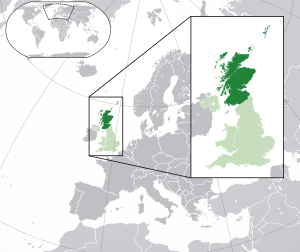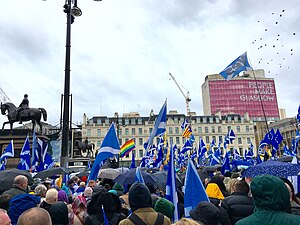

| This article is part of a series within the Politics of the United Kingdom on the |
| Politics of Scotland |
|---|
 |
Scottish independence (Scottish Gaelic: Neo-eisimeileachd na h-Alba; Scots: Scots unthirldom)[1] is the idea of Scotland regaining its independence and once again becoming a sovereign state, independent from the United Kingdom. The term Scottish independence refers to the political movement that is campaigning to bring it about.[2][3][4][5]
Scotland was an independent kingdom through the Middle Ages, and fought wars to maintain its independence from England. The two kingdoms were united in personal union in 1603 when the Scottish King James VI became James I of England, and the two kingdoms united politically into one kingdom called Great Britain in 1707.[6] This movement united the countries which ended the wars of independence and created relative peace. Political campaigns for Scottish self-government began in the 19th century, initially in the form of demands for home rule within the United Kingdom. Two referendums on devolution were held in 1979 and 1997, with a devolved Scottish Parliament being established on 1 July 1999.
The pro-independence Scottish National Party first became the governing party of the devolved parliament in 2007, and it won an outright majority of seats at the 2011 Scottish Parliament election. This led to an agreement between the Scottish and UK governments to hold the 2014 Scottish independence referendum. Voters were asked: "Should Scotland be an independent country?"[7] 44.7 percent of voters answered "Yes" and 55.3 percent answered "No", with a record voter turnout of 85 percent. This resulted in Scotland remaining in the United Kingdom.[8][9]
A second referendum on independence has been proposed, particularly since the UK voted to leave the European Union in a June 2016 referendum and since pro-independence parties increased their majority in the 2021 Scottish Parliament election. In June 2022 Nicola Sturgeon proposed the date of 19 October 2023 for a new referendum on Scottish independence, subject to confirmation of its legality and constitutionality.[10] In November 2022 the Supreme Court of the United Kingdom ruled that the Scottish Parliament did not have the power to legislate for a second referendum.[11]
- ^ "Inside Information". The Herald. 31 August 1993. Retrieved 8 September 2014.
- ^ "Brexit: Scots prefer independence to no-deal, poll finds". The Scotsman. 9 December 2018. Retrieved 12 December 2018.
- ^ Brooks, Libby (15 November 2018). "Sturgeon: Brexit chaos makes independence case stronger every day". The Guardian. Retrieved 12 December 2018.
- ^ "Scottish nationalists want to take back control". The Economist. 11 October 2018.
- ^ Massie, Alex (15 December 2019). "Never mind Brexit – Boris Johnson's biggest battle is Scotland trying to take back control" – via www.thetimes.co.uk.
- ^ "Union with England Act 1707". British Government. Retrieved 12 August 2021.
- ^ "Scotland's Referendum 2014 - Background". Retrieved 8 September 2014.
- ^ Cite error: The named reference
Nowas invoked but never defined (see the help page). - ^ "Referendum results: Turnout a record high as Scots vote No to independence". Scotland Now. 19 September 2014. Archived from the original on 11 April 2020. Retrieved 20 September 2014.
- ^ Sturgeon, Nicola (28 June 2022). "Nicola Sturgeon's full statement announcing the 2023 independence referendum". Scottish National Party. Retrieved 28 June 2022.
- ^ "Scottish independence: Will there be a second referendum?". BBC. 23 November 2022. Retrieved 27 November 2022.